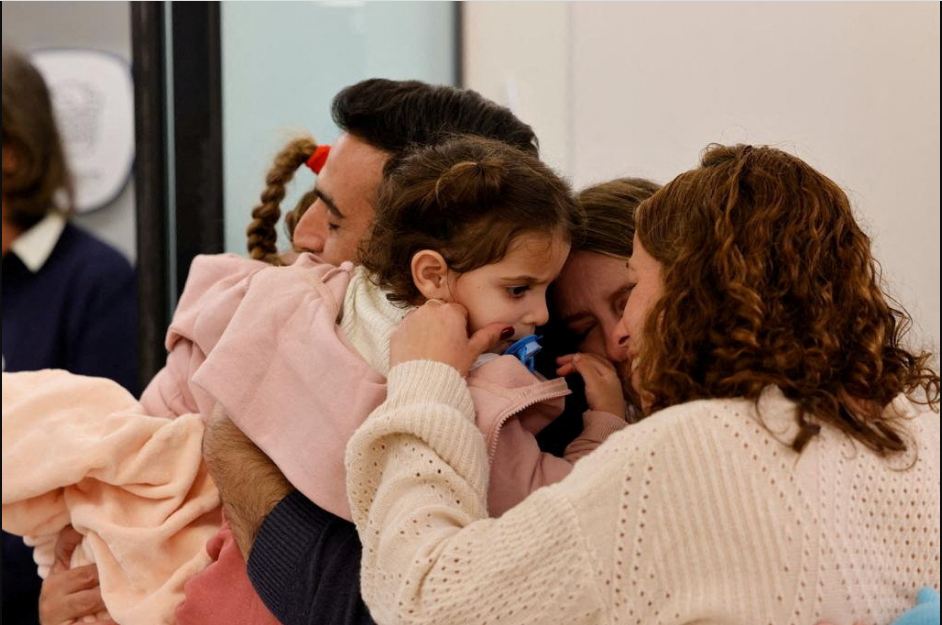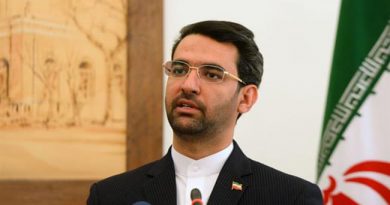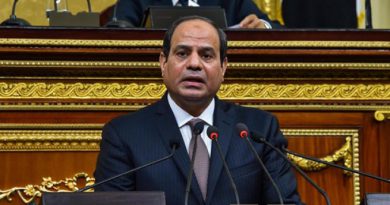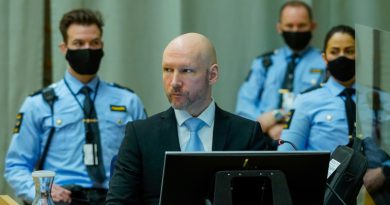Second hostage-for-prisoners release looms, Egypt sees ‘positive signals’ on Gaza truce extension
Gaza/Jerusalem (Reuters) – Hamas was expected to release a second group of Israelis on Saturday under a deal to allow an exchange of 50 hostages for Palestinian prisoners, and Egypt indicated the four-day truce could be extended by one or two days.
An Israeli military spokesman told French TV BFM that, barring last minute changes, 13 Israeli hostages were expected to be freed Saturday, while 39 Palestinian prisoners would be released in return.
Earlier, Egyptian security sources had said they had received the names of 14 Israeli women and children from Hamas and were waiting for more details.
Egypt, which controls the Rafah border crossing through which vital aid has resumed passing into the Gaza Strip under the truce accord, also said it had received “positive signals” from all parties over a possible extension of that deal.
Diaa Rashwan, the head of Egypt’s State Information Service (SIS), said in a statement Cairo was holding extensive talks with all parties to reach an agreement which would mean “the release of more detainees in Gaza and Palestinian prisoners in Israeli jails.”
Under the existing deal, a total of 50 hostages are to be exchanged for 150 Palestinian prisoners, some of them convicted on weapon charges and violent offences, over four days. The first exchange took place on Friday.
Among the Israelis freed on Friday after almost 50 days in captivity in Gaza was nine-year-old Ohad Munder, who ran down a hospital corridor in Israel into his father’s open arms, footage released by the hospital showed.
He and three other children released at the same time were in relatively good condition, Gilat Livni, the centre’s Director of Paediatrics told reporters.
“I dreamt we came home,” another hostage, four-year-old Raz Asher, said sitting in her father’s arms on a hospital bed after she and her mother and younger sister were freed. “Now the dream came true,” her father, Yoni, replied.
Hamas fighters freed a total of 24 hostages on Friday – 13 Israelis, 10 Thai farm workers and a Filipino – and Israel later released 39 Palestinian women and teenagers from detention.
Aid Trucks
Both sides have said hostilities would resume as soon as the truce ends, though U.S. President Joe Biden said there was a real chance of extending the truce.
Israel has vowed to destroy Hamas after its fighters killed 1,200 people and took about 240 hostages after they broke through security barriers around the Gaza Strip and rampaged through Israeli communities around the blockaded enclave.
Since then, Israel has rained bombs on Gaza, killing about 14,000 people, roughly 40% of them children, Palestinian health authorities say.
For many of the 2.3 million people who live in the tiny Gaza Strip, the pause in the near-constant air and artillery strikes has offered a first chance to safely move around, take stock of the devastation, and seek access to aid imports.
“We hope the truce will continue and be permanent, not just four or five days. People cannot pay the cost of this war,” said Ayman Nofal, in a street market in Khan Younis, in southern Gaza.
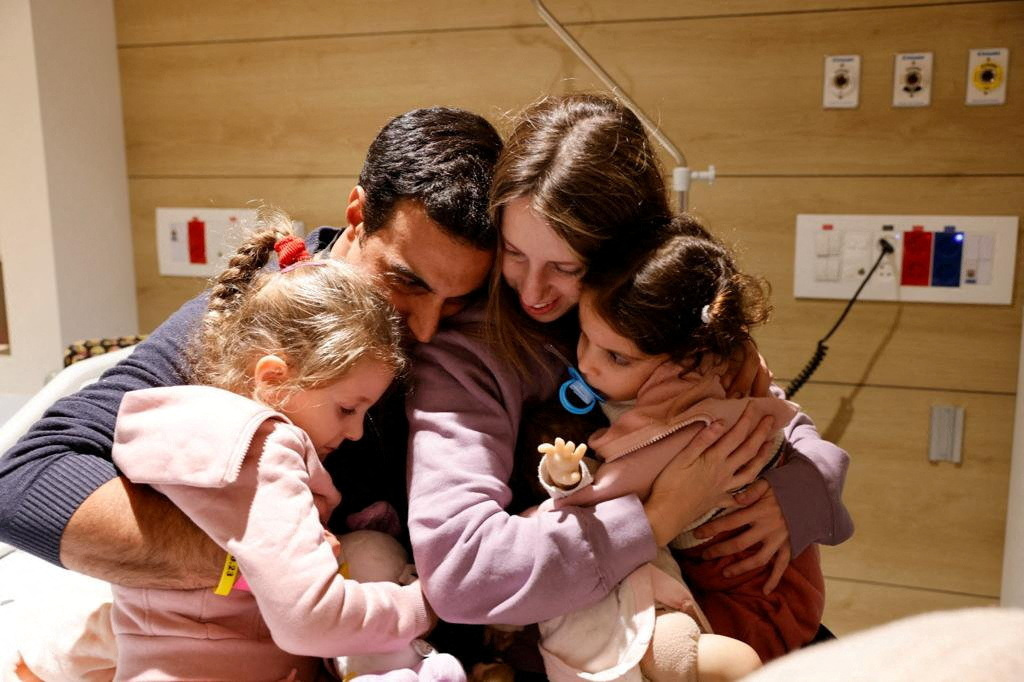
[1/9]Aviv Asher, 2,5-year-old, her sister Raz Asher, 4,5-year-old, and mother Doron, react as they meet with Yoni, Raz and Aviv’s father and Doron’s husband, after they returned to Israel to the designated complex at the Schneider Children’s Medical Center, during a temporary truce between Hamas and… Acquire Licensing Rights Read more
Fifty trucks carrying food, water, shelter equipment, and medical supplies, have been deployed to the northern Gaza Strip and to shelters in non-evacuated areas of the Palestinian enclave, Israel said.
This was the first time since the start of the war that a significant amount of aid was deployed to northern Gaza, according to the Israeli Defence Ministry agency that coordinates with the Palestinians.
‘Breathe Little’
A U.N. convoy delivered aid to two shelters for displaced people in northern Gaza for the first time in over a month, the U.N. humanitarian office said.
“We are happy with the truce, it gave the people the opportunity to breathe a little bit,” Palestinian resident Haitham Ahmed said.
Four fuel trucks and four more carrying cooking gas passed through the Rafah crossing into Gaza early on Saturday. Palestinians, suffering acute fuel shortages due to Israel’s blockade of the enclave, stood in long queues to fill their gas cylinders.
But Mohammed Ghandour who waited five hours to fill his cylindrical metal canister, left empty-handed. “I’m now going home without gas,” he said.
Aid groups have also used the temporary truce to evacuate patients and health workers from some northern hospitals that have all but collapsed due to attacks and lack of fuel.
‘Still Afraid’
Thailand welcomed the release of 10 of its nationals from Gaza on Friday under a separate track mediated by Egypt and Qatar, and said a further 20 were still behind held. Iran said it helped facilitate that release.
Among those freed was Thai farm worker Vetoon Phoome, whose family thought he had been killed in the Hamas attack seven weeks ago, according to his sister, Roongarun Wichagern.
In Palestinian homes, the joy of being reunited with loved ones was tinged with bitterness. In at least three cases, prior to the prisoners’ release, Israeli police raided their families’ homes in Jerusalem, witnesses said. Police declined to comment.
“There is no real joy, even this little joy we feel as we wait,” said Sawsan Bkeer, the mother of 24-year-old Palestinian Marah Bkeer, jailed for eight years on knife and assault charges in 2015.
Israeli police were seen raiding her Jerusalem home before her daughter’s release.
“We are still afraid to feel happy,” she added.
In Khan Younis, Tahani al-Najjar, a Palestinian woman returning to home to find it in ruins, said a pause in the fighting was not enough.
“Tell me what we got out of this truce?,” she asked. “What we got out of this truce? You only made our hearts hurt. Do you want to find a solution for us? You should make a permanent truce for us.”
